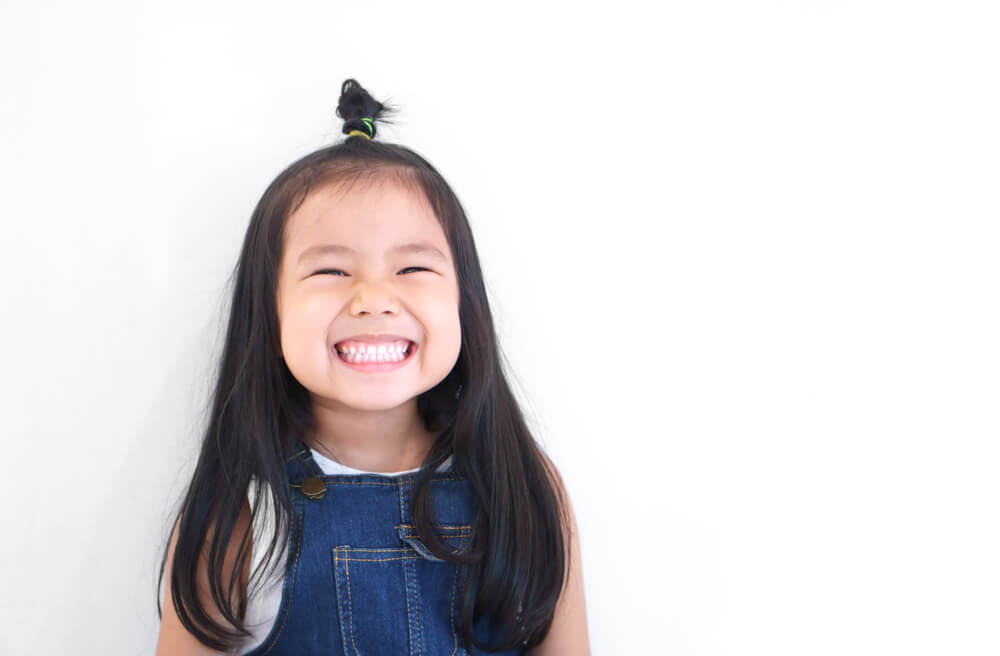
It can be a little alarming when your baby or toddler clenches their teeth and grinds them. While the sounds of a baby grinding teeth can make you cringe and you might worry if they’re damaging those newly erupted pearly whites, it’s very common and usually completely normal. A teething baby or toddler is faced with new sensations and grinding may just be them exploring or trying to combat the discomfort of a tooth breaking through the gumline. However, habitual teeth grinding, or bruxism, can be an issue. Our Park Slope and Williamsburg pediatric dentists will cover why kids grind their teeth, when it’s a concern and what you can do to keep your little one’s smile healthy.
Table of Contents
What is Bruxism?
Bruxism is a condition that affects people of all ages, including young children. It involves grinding, clenching or gnashing the teeth. It’s typically unconconscious, meaning kids do it without thinking about it. When kids grind their teeth when they’re awake, it’s called awake bruxism. Clenching or grinding teeth at night during sleep is called sleep bruxism. When children have sleep bruxism, they may also have other sleep disorders like snoring or sleep apnea.
Why do Kids Grind Their Teeth?
As we mentioned, a baby or toddler grinding teeth could just be their way of learning about how their mouth works or it can be a response to teething pain. When it’s a regular occurrence, kids’ bruxism may be due to anxiety, stress or frustration, or it could be an unconscious habit when they’re concentrating really hard. Sleep bruxism may be anxiety-related but many times it’s because of some sort of arousal during sleep like the awakenings that occur with sleep apnea, which children can experience too. Other risk factors for teeth grinding in children include:
- Age – Teeth grinding in young children is common and it often goes away by their teenage years.
- Medications – Certain medications, including those used to treat ADHD can increase the likelihood of teeth grinding in kids.
- Genetics – Sleep bruxism can run in families.
- Other Disorders – Conditions and issues, including sleep apnea, epilepsy, night terrors and ADHD are tied to teeth grinding in children.
When to Visit a Pediatric Dentist About Teeth Grinding in Children?
Mild bruxism in babies and toddlers probably doesn’t need treatment and they’ll likely outgrow it. That said, there are always exceptions to normal teeth grinding that suggest a number of symptoms to look out for. However, if you’re concerned, you can always bring it up with your pediatric dentist at your child’s regular exam. More aggressive grinding can lead to damaged or worn teeth, tooth and jaw pain, earaches or headaches. In older children, it’s a good idea to keep a closer eye on teeth grinding so that they don’t damage their permanent teeth. If your child is in pain because of teeth grinding, call your pediatric dentist and schedule a visit.
How to Stop Teeth Grinding in kids
If you have a toddler or baby grinding teeth in response to teething, you can try offering a teething toy for them to chew on. Counterpressure alleviates some of the discomfort of a tooth coming in, so chewing on things helps. For a DIY teether, you can give them a moistened, chilled wash cloth to chew on.
In older children, if you think teeth grinding is due to anxiety or stress, try getting to the root of the problem. Dealing with the cause of the stress and introducing them to other coping mechanisms can help stop teeth grinding.
If your child has sleep bruxism and it’s damaging their teeth or causing jaw pain, we sometimes will create a custom nightguard. This mouthguard helps cushion the impact from grinding, which prevents damage to the teeth and temporomandibular joint (TMJ). If the teeth clenching or grinding is in conjunction with another sleep issue like sleep apnea, that would likely need to be addressed as well.
While most of the time, kids will outgrow teeth grinding and it won’t lead to any complications. However, if you’re worried or your child is having pain because of it, schedule a visit at Bitesize Pediatric Dentistry. We’ll chat with you and examine your child to determine if your little one could benefit from an intervention like a mouthguard. To see how we’re keeping our Brooklyn pediatric dental patients safe, check out what’s changed at our office due to COVID-19 here.






